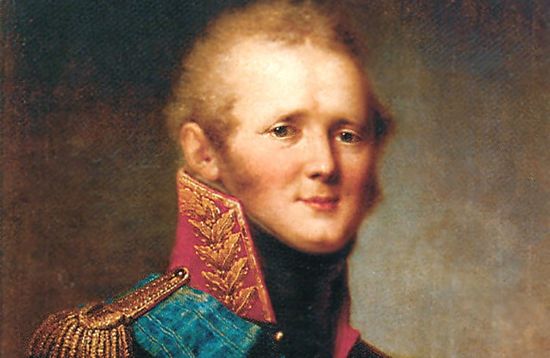Carême and the Czar

So if Antonin Carême lived in Paris, why did he design a dessert to appeal to Russians? There are two parts to that answer. First, Russian food and manners were all the rage in Paris around 1810. Napoleon and Czar Alexander I of Russia were allies then, and Czar Alexander had dispatched a very dapper and glamorous ambassador to look after Russia’s interests in Paris. His name was Alexander Kurakin, and it was he who not only introduced Russian dishes to Parisian society, but also the single-plate course-after-course dining style known as service à la russe. We employ it in our restaurants, even homes, to this day.
The second part of the answer has to do with the dissolution of that alliance I mentioned. Napoleon being Napoleon, it didn’t take him long to alienate Alexander. Indeed relations turned downright icy when Napoleon invaded Russia in 1812 and sacked and burned Moscow for good measure. Napoleon’s Grande Armée got the worst of it in the end, however. During the disastrous winter withdrawal from Russia most of Napoleon’s 450,000-man army either froze to death or were killed by raiding Cossacks. But that didn’t make Alexander feel any better. He threw away Napoleon’s BFF pin, then deleted Napoleon’s name from his list of Facebook friends.
Even worse he joined forces with the Austrians and Prussians, Napoleon’s bitter enemies. Together in late 1813 they defeated Napoleon’s forces at the Battle of Leipzig and in March of the following year they, er…marched into Paris. It was the first time the city had been taken in some 400 years. Arriving in Paris, Czar Alexander was in no hurry to leave. He considered taking over the Palace of Versailles as a temporary residence but heard it was booby trapped, so he moved into Talleyrand‘s Paris house instead. There he stayed for many months enjoying Talleyrand’s hospitality, the centerpiece of which was the food prepared by Talleyrand’s personal chef, Antoine Carême. It was probably here and under these circumstances that Carême created strawberries Romanoff, named for the Russian imperial dynasty of which Alexander was member.
When June of 1814 arrived the last of the strawberries had presumably been eaten. Which meant it was time to leave. Czar Alexander went to London, where he failed to find any more strawberries, and eventually on to Vienna, but strawberries had been out of season there for months by then. Frustrated, he completed the divvying up of Europe at the Congress of Vienna and went home to St. Petersburg. There he sent repeated offers to Carême imploring him to come to Russia and work for him. In time Carême accepted Alexander’s proposition, but in the end stayed only a few months in St. Petersburg before quitting and moving back home to France.
As for Alexander, he lived the rest of his life without ever again tasting Carême’s cooking. Which wasn’t easy for a man of his refinement and sensitivity. Ever a moody sort he spent the last half dozen years of his life trudging gloomily around his empire, bereft of macerated fruit. He died in 1825 while on a state visit to the southern port city Taganrog, or at any rate that’s the official story. For indeed more than a few people believe that he didn’t die — he was only 48 and in robust health at the time — but rather engineered his own disappearance. Whose identity might he have assumed? Where might he have gone? What did he eat once he got there? Were there any strawberries involved? These vital questions may never be adequately answered.
Have you seen this graphic of Napoleon’s losses in Russia? Astonishing. http://en.m.wikipedia.org/wiki/File:Minard.png
Would you believe I actually have a print of that framed on my office wall? I really do.
– Joe
It looks like a map of Long Island.
It is. Don’t tell anyone. I’m making this up as I go along!
– Joe
Ah the Romanovs – so much fun history in that family. Alexander was Queen Victoria’s godfather and she was named in his honor – Alexandrina Victoria. As for Napoleon and his invasion of Moscow, it resulted in Tchaikovsky’s 1812 Overture which will be played quite often over this 4th of July holiday. It’s odd that a composition that marks the defeat of the French should become a staple of American patriotic music, but I love it. Let the church bells ring and the cannons roar.
I think of it as a sort of musical Freudian slip: accidentally revealing of how we feel about the French deep down.
I keed, I keed…without the French and their hatred of the British, where would our republic be? Maybe nowhere. One day I’ll find an excuse to write a post about Lafayette, another on my favorite characters from history!
Thanks, Ellen!
– Joe
It is interesting to note that the Russians of the period had a deep appreciation of all things French. They saw in France all the things they believed they lacked. It is still the highest insult to a Russian to say he is uncultured. I think they believe their society is a bit backward and barbaric and are sensitive about that.
Having been from one end of Russia to the other I sort of agree with them! 😉
Actually I like Russian culture. It runs the gamut from very refined to extremely rough around the edges…sort of like our own! Thanks for the comment…hope Gettysburg was everything you hoped for!
Cheers,
– Joe